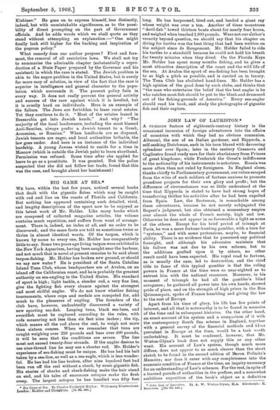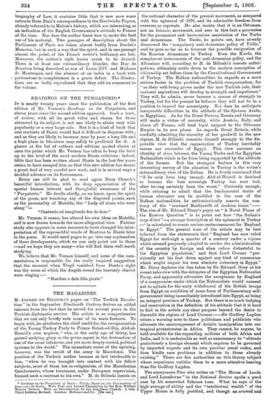JOHN LAW OF LAURISTON.*
A CURIOuS feature of eighteenth-century history is the occasional incursion of foreign adventurers into the affairs of countries with which they had no obvious connexion. Alberoni, the son of an Italian gardener, and Ripperda, a self-seeking Dutchman, each in his turn blazed with devouring splendour over Spain; later in the century Casanova and Cagliostro found ready ears for their charlatanry from Princes of great kingdoms; while Frederick the Great's indifference to the nationality of his instruments is notorious. Russia was more often than not ruled by foreigners. In England alone, thanks chiefly to Parliamentary government, our rulers escaped from the wiles of such soldiers of fortune anxious to promote grandiose projects for their own glory and profit ; but the difference of circumstances was so little understood at the time that Ripperda is stated to have had strong hopes of transferring thither his activities after he had been expelled from Spain. Law, the Scotsman, is remarkable among these adventurers, because he not merely subjugated the Regent's judgment, but also obtained a momentary empire over almost the whole of French society, high and low. Otherwise he does not appear in so favourable a light as some of the others. Except for his brief period of triumph at Paris, he was a mere fortune-hunting gambler, with a turn for " systems," and with some pretensions, maybe, to financial ability. There is no evidence that be possessed any political foresight, and although his advocates maintain that his failure was not due to his own scheme, but to the additions grafted upon it by others, no other result could have been expected. His royal road to fortune, as is usually the case, led to destruction, and the chief title to fame of this typical gambler is that the ruling powers in France at the time were so near-sighted as to entrust him with the national resources. Moreover, in his moment of triumph he had all the gambler's blind arrogance ; he gathered all power into his own hands, showed pride of place, and on the strength of high prices in the Rue Quincampoix, spoke of France bumbling and giving the law to the rest of Europe.
Apart from his time of glory, his life has few points of interest, and all that is noteworthy is to be found in memoirs of the time and in subsequent histories. On the other hand, an exact account of his system and a comparison of it with the contemporary South Sea scheme in England, together with a general survey of the financial methods and Lhas prevalent in Europe at the time, would be a task worth undertaking. It must be confessed, however, that Mr. Wiston-Glynn's book does not supply this or any other want. His account of Law's system, though much more diffuse, does not appear to us much clearer than the short sketch to be found in the second edition of Baron Pollnitz's Memoirs; nor does it enter with any completeness into the economic condition of France at the time, an inquiry necessary for an understanding of Law's schemes. For the rest, in spite of a learned parade of authorities in the preface, and a somewhat ambitious exposition of the book's object as a definitive
• John Law of Lauriston. By A. W. Wiston-Glynn, 11.a. Edinburgh: E. Saunders. ElOs. Bd. net.1
biography of Law, it contains little that is new save some extracts from Stair's correspondence in the Hardwicke Papers, already referred to in Mahon's history, which are interesting as at indication of the English Government's attitude to France at the time. Nor does the author know how to make the best use of his material. Two passages of description about the Parliament of Paris are taken almost bodily from Duclos:s Memoirs, but in such a way that the spirit, and in one passage almost the point, of the French writer's brilliancy are lost. Moreover, the author's style leaves much to be desired. There is at least one extraordinary blunder, the Duo de Bourbon being described as son of Louis XIV. and Madame de Montespan, and the absence of an index in a book with • pretensions to completeness is a grave defect. The illustra- tions are so badly reproduced that they add no ornament to the volume.







































 Previous page
Previous page